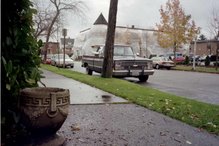TRANSPORTING MORE THAN FOOD
When I opened to the map of Virginia I found myself where I had located place names from the song by Robert Mitchum, Thunder Road. The sound of Mitchum's voice, like that of Tennessee Ernie Ford, familiar from the radio in the nineteen fifties, was what was referenced when discussions rose about a homogenization of the dialect of America through mass media. These names, Harlan, Cumberland, Maynardville, must have become part of Mitchum's awareness in his youth, since according to Baby, I Just Don't Care, by Lee Server, Robert Mitchum rode the rails in the depression as a teenager.
These places - Harlan, Cumberland, Maynardville, are within an hour's drive of the town near Barbara Kingsolver's farm. The main theme of Animal, Vegetable, Miracle is that by choosing local produce everyone spares transportation fuel, packaging, and unhealthy additives. A significant compromise in her life style is her own car, and in her story she travels many miles in the United States and in other countries. When she sees a horse plowing from the air as the plane lands in Italy, she feels, "I've come home."
Thunder Road, the movie, is about moonshine, in Animal, Vegetable, Miracle on page 77 Kingsolver mentions that "whiskey was once the most practical way to store, transport, and add value to the small corn crops that were grown here."
In the Mitchum biography, Lee Server tells of Mitchum arrested for vagrancy and in leg irons, that the wearing of the irons created an injury to the legs. Others in custody showed the fourteen-year-old that he could run away during work hours, that in that locale the guards would not chase him - they did shoot at him, but he made his way back to his home in Delaware. And at that point his leg injury had become infected. A doctor told his mother his leg should be amputated, it was her adherence to folk-medicine poultices from herbs she gathered that over many weeks healed Mitchum's leg.
Kingsolver's region reached my childhood only through the song, Thunder Road. Transporting art because of changes in technology - realistic stereo record players, sophisticated recording, international jet travel - added up to World Music.
My mother was a talented piano player all her life, accompanied the heritage group choir and was their director at different times, and played in their family Swedish and Swedish-Finnish dance band. She traveled twice to Finland and Sweden and performed. At a point in the nineteen thirties with the radio on she found a new song, Mockingbird Hill, used the tune to Life in the Finnish Woods, an old Finnish dance tune. Thunder Road in 1958 was the same experience. It used the tune to Midsummer Dance, an old Swedish dance tune, and part of her family orchestra's song list. I had known that song performed by my mother on the piano before I heard it performed on the radio by Robert Mitchum.
New technology makes the theme and titles at the start of the movie Thunder Road available on You Tube. The biographer Lee Server states it was Mitchum's mother's idea to set his lyrics to what she knew as a Norwegian Dance Tune. The tunes may be included in both traditions; other tunes are included in both the Norwegian and Swedish music traditions.
When Amazing Grace came out as a movie I began to realize the song contained themes present in the title theme to Gone With the Wind, and themes present in the title theme to The Long Hot Summer. In books about movie scores I read about the work of Alex North, without a discussion of his work on the score to The Long Hot Summer. "Once I was lost, but now I'm found," echoes in the music of those films.
My mother said to me once, When I was working and had to buy something downtown on a Saturday, sometimes I would go to a movie by myself. So when I locate Thunder Road on DVD so I can watch it on a player available to me, it is the same thing my mother used to do.
I realize that when I think about the presence of themes in music I am doing the same thing my mother used to do. This becomes another variation on the idea that women find themselves doing exactly what their mother always did. When I was freshman at the U of Washington in 1967 my mother discovered that Gone With The Wind had been re-released. It did not show in Tacoma, so she arranged a trip by bus for herself to Seattle so she could see it at a matinee and got my roommate and me to meet her there so she could treat us.
Kingsolver's region somehow is the Appalachians, the Blue Ridge Mountains, and including the Great Smoky Mountains. Animal, Vegetable, Miracle is Tacoma Reads Together's 2009 choice. The book group that meets almost every month is assigned to discuss this at 12:10 on January 20th - the inauguration will have preceded us at nine a.m. Pacific Standard Time.
Clearly Tacoma Reads Together chooses local produce to emphasize at this time, that by choosing local produce everyone spares transportation fuel, packaging, and unhealthy additives.
Windows Live™: Keep your life in sync. Check it out.


No comments:
Post a Comment